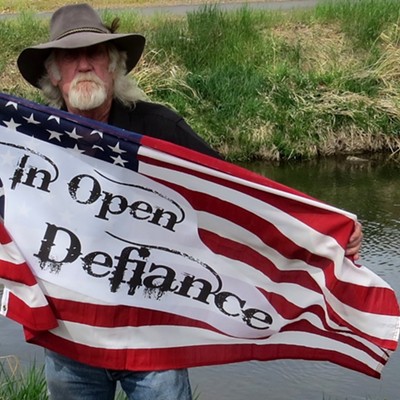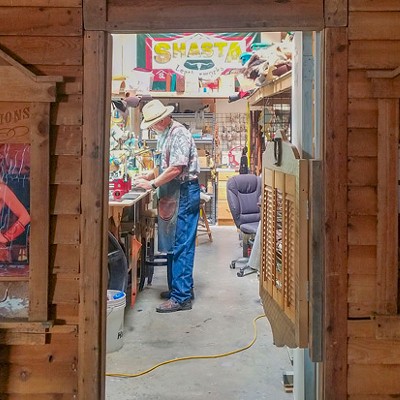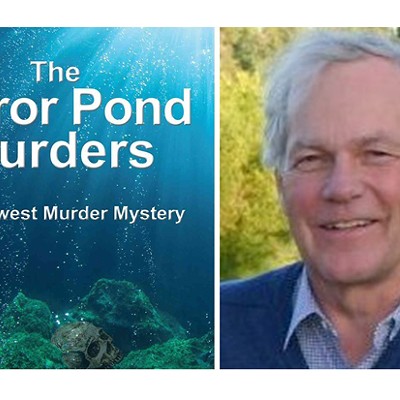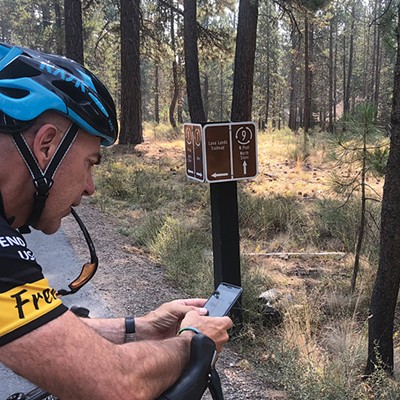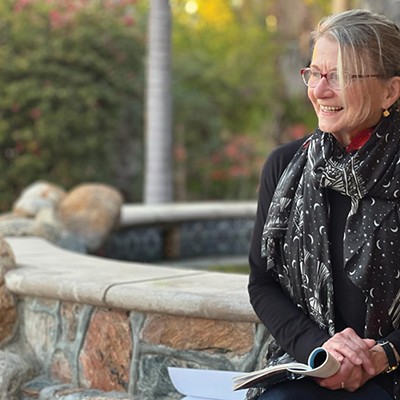Reading clubs are not the exclusive domain of Oprah. No, in fact, these books—written by Central Oregon men—are great gifts that speak to the inherent manliness of our region. Rodeo riders, straight-back farmhands, clever alt-energy scientists, and clear-minded retirees populate these stories—some true, others based on true historical events, and all set in places you will instantly recognize.
"On the Road From Burns," by Ted Haynes
To call a book easy reading, in this case, is meant as a no-holds-barred compliment. Ted Haynes' latest book, On The Road From Burns, is a collection of short stories, each bouncing around Central Oregon and the past 150 years. But in spite of the change of years in each short story, from an Indian chief's wife re-accounting her first conversation with a white man in 1873 to a suspenseful story in 2005 about a long-lost child returning home, there are two constants: One, the setting, as each story is in Central Oregon and helps define how the familiar landscape shapes people's identities; and, two, the straight talking tone, a direct and conversational voice that wisely tucks wry humor in between the lines. This plain-spoken verse is especially welcome, as too often books that strive to define a "sense of place" decorate the stories with far too much purple prose, trying to paint elegant portraits of the mountain ranges and juniper prickly dessert. No, instead, Haynes focuses on the people who populate this space—and, in doing so, provides a wide-reaching, yet concise assessment of Central Oregon. Haynes also co-authored "Vandevert-The Hundred Year History of a Central Oregon Ranch." (PB)
"Halfway to Halfway and Other River Stories," by Dick Linford and Bob Volpert
Dick Linford and Bob Volpert preface the river lore in "Halfway to Halfway" with a familiar story-telling sentiment, "It's true even if it didn't happen," a quote from Chief Bromden in "One Flew Over the Cuckoo's Nest" is inscribed in the first pages of the "non-fiction" compilation of river running stories. That quote might as well be the international raft guide's motto—that, or something like, "Don't let the truth get in the way of a good story."
I know this because my dad was a raft guide. Growing up, there was always a rotating cast of goofy "uncles," my dad's guiding buddies who hung around our garage drinking beers and telling river stories identical to those recalled in "Halfway to Halfway."
Linford and Volpert know the raft guide subculture first hand. They both made careers of the swampy, play hard, party hard hard lifestyle; in Lindford's case, for more than forty years.
Written more conversationally than formally, it's not hard to imagine the grizzled, river-washed guides retelling each of the stories over a few beers. The tall tales memorialized in this book are written with a humor and passion that makes the thirty or more years that have passed since the event, fade away.
The book is stuffed to the oars with river lore for the ages. The stories vary from bummed rides to borrowed rafts running over 60-foot dams to dumpster diving on the Grand Canyon. They're the stories every river outfitter aims to keep secret, but every old-timer's guide party devolves into. The ones that really stick out from a lifetime of river running memory between Linford, Volpert and 14 other contributors. (BB)
"Red White Black, A True Story of Race and Rodeo," by Rick Steber
Before 1911, there wasn't much racial diversity at the Pendleton Roundup. But somehow, in that year, a Native American, Jackson Sundown; an African-American, George Fletcher; and a white pioneer, John Spain, ended up in the final round of the Northwest Saddle Bronc Championships. Pitted head-to-head, Prineville-based writer Rick Steber retells a Wild West exploration of race and cowboy culture. Through the men's three divergent histories, "Red White Black" contextualizes the past of race and rodeo.
The author of more than thirty titles, Steber spent decades researching this specific story of a contested decision at the Roundup, and the vast and fascinating backgrounds of the competing men. Together, they weave a patchwork history of rodeo culture in the early 20th century.
Peppered with black and white photographs and vivid detail, Steber retells a story that's been buried in Prineville for over a century—and does so with a clarity and vibrancy that allows the reader to hear the cheers of "let'er buck" ringing out in the sun-scorched arena. The three men's stories weave together into one American West epic that ends in the crowning of the people's champion. (BB)
"Failure Is Not An Option," by David Rosell
Less a novel (although there are engaging personal life stories that read like an adventure book) and more a smart, clear-minded, life-coaching manual for financial survival (and success) in retirement, "Failure Is Not An Option" is a great gift for anyone over the age 50 who isn't Warren Buffet. A hodge podge of quotes from aging rockers, clipped cartoons and pithy travel stories, the book is both a memoir (of sorts) and a how-to book. It is a scrapbook approach that works well, and is held together by writer and financial planner David Rosell's approachable, easy-going voice, which, like best-selling author Malcolm Gladwell, provides a stream of information and then hones it to a specific lesson—in this case, about financial security in retirement. Rosell is the past chairman of Bend's Chamber of Commerce and City Club of Central Oregon. He clearly has acquired financial smarts over the decades, as well as a buttoned-down approach to life—wisdom that he dispenses in several different formats, ranging from well-laid-out financial blueprints to quippy take-aways (like turning "paychecks" into "playchecks"). It is an easy, insightful and informative read that can be taken in small bites, or devoured in one afternoon sitting. (PB)
"Crossing Savage," by Dave Edlund
Although not available until March, mark your shopping calendars for a debut novel by another local author, Dave Edlund (maybe a St Patrick's Day gift?). Already, the book is receiving high praise; "fast-paced and lively, reminiscent of a Tom Clancy thriller," says the US Review of Books. And, much like Clancy, whose first book, The Hunt for Red October, was published by a small press, and was highly technical, Edlund is the real deal: He is an expert in hydrogen energy and holds dozens of patents. The book knows what it is talking about: One by one, the leading alt-energy experts are being killed. Meanwhile, two locals (as in Bend, Oregon) are trying to keep their own energy source a secret. "My story is as much about the process of getting a first book published as it is the book itself," adds Edlund. (PB)

